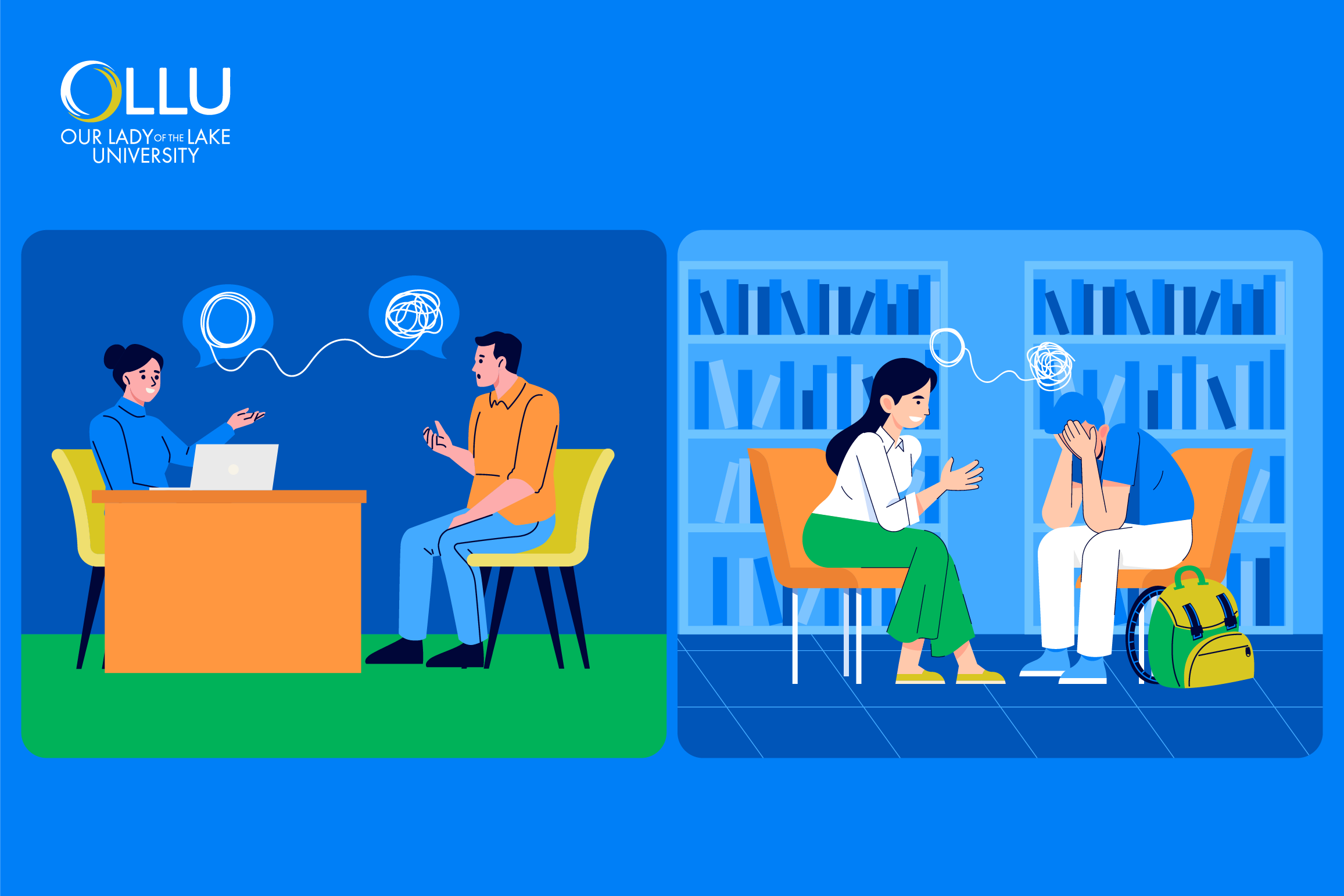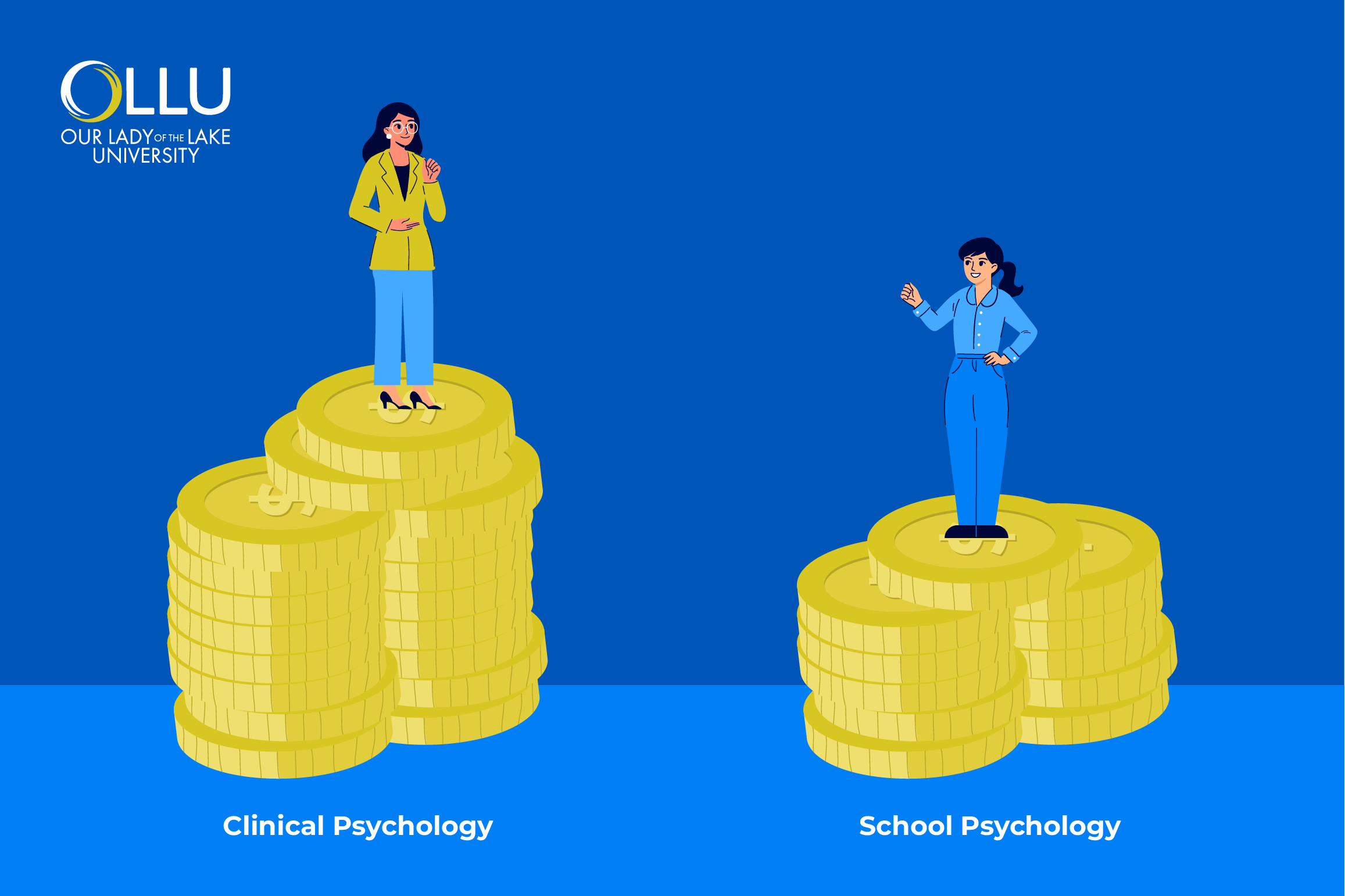School Psychology vs. Clinical Psychology: Key Differences
May 05, 2024

As you explore the broad field of psychology, two prominent specializations stand out: school psychology and clinical psychology. Although the overarching goal of these fields is promoting mental health and overall well-being, they serve different purposes and cater to various populations. By shedding light on these distinctions, you'll be able to navigate these two fields of psychology, whether you're an aspiring psychologist or seeking psychological services.
In this blog, we'll delve into the key differences between school and clinical psychology by exploring their respective focuses, work environments, client populations, training, and more.
What is School Psychology?
School psychology is a field of psychology that combines the principles of psychology and education. This field focuses on supporting students' academic, social, and emotional development within educational settings. School psychologists advise and treat students on a broad range of youth and school-related issues, including:
- Learning disorders,
- Parent-teacher relationships,
- Behavioral problems,
- Social interactions,
- Student-teacher relationships,
- Peer pressure, and
- Bullying.
What is Clinical Psychology?
Clinical psychology is a specialty that applies psychological research and techniques to diagnose, treat, and prevent mental health issues, emotional disorders, and abnormal behaviors. It provides comprehensive mental and behavioral healthcare to individuals, couples, families, and groups.
These professionals typically work on the following:
- Assessing and diagnosis mental health issues;
- Developing and providing treatment plans
- Researching new methods or treatments;
- Consult with other professionals to develop comprehensive treatment plans.
School Psychology vs. Clinical Psychology: Key Differences
While there's some overlap between the two fields, such as providing counseling and behavioral intervention services, there are critical differences between the two. A key difference is the focus of practice, with school psychology specializing in addressing issues within the educational context. Clinical psychology, on the other hand, has a broader focus on mental health across different populations and settings. In this section, we'll explore the key differences between school and clinical psychology, focusing on their roles, requirements, and practice settings.
Education Requirements
Although both school and clinical psychologists must earn a bachelor's degree in psychology or related field, theyfollow a different educational path. Following a bachelor's degree, school psychologists must earn a master’s degree in school psychology, which is usually a three-year program. Some may even pursue a doctorate in psychology for advanced expertise and training.
While a master's degree is the minimum requirement for becoming a school psychologist, clinical psychologists must earn a doctoral degree in clinical psychology. The doctorate can be a Doctor of Philosophy (Ph.D.) in psychology or a Doctor of Psychology (Psy.D.) degree, both of which provide a deeper understanding of the principles of clinical psychology. The coursework of a Ph.D. program includes research design, behavioral assessment methods, advanced statistics, and ethics. Conversely, the coursework of a Psy.D. program includes advanced psychopathology, clinical supervision strategies, psychological testing, and theories of psychotherapy.
Salary

Although both school psychologists and clinical psychologists earn high salaries, there are stark differences between their earnings. According to the Bureau of Labor Statistics (BLS), the mean annual salary for school psychologists is $91,990. However, location, setting and years of experience can affect your earnings as a school psychologist. For example, school psychologists employed by child care services typically earn more than those in elementary and secondary schools. While school psychologists' from Colorado, California, or New York earn more than those in Montana, Idaho, or Alabama.
On the other hand, clinical psychologists tend to earn a higher salary of $106,600. The higher compensation is a result of the advanced education and training required. Here again, there are variations in earning potential within the profession. Clinical psychologists employed in the scientific research and development services industry usually earn more than those in physicians' offices.
Job outlook
In general, the employment of psychologists is projected to grow six percent from 2022 to 2032, with about 12,800 new openings every year.
The BLS data predicts that school psychologists will see a one percent growth in employment, with 800 openings estimated each year. Job opportunities will continue to rise due to the increased awareness of the effect of mental health on learning. However, this demand is tempered by state and local funding for schools, which is insufficient in some schools.
On the other hand, employment for clinical psychologists is projected to grow 11 percent, with about 7,770 openings each year. This high demand for clinical psychologists will continue to grow as more and more people choose to seek help for their mental healthcare needs.
Work environment
Both school and clinical psychologists provide psychological services to clients, but the work environments and their daily responsibilities differ greatly.
School psychologists primarily work in elementary, middle, and high schools. Some may even work in clinics or hospitals that treat school-aged children or specialize in treating school-related issues.
They collaborate closely with teachers, administrators, and parents to support students' academic success and mental health. Their responsibilities also include the following:
- Assessing students;
- Evaluating instruction programs;
- Supervising psychological services;
- Determining treatment accountability and integrity.
Whereas, clinical psychologists can work in various healthcare settings, such as hospitals, private clinics, community health centers, and mental health facilities. Though they work in medical settings, they don't prescribe medications—except in some states, such as New Mexico or Louisiana, where clinical psychologists can prescribe medications after receiving special certification.
As a broad field, clinical psychologists can choose from a wide variety of subspecialties, such as adult mental health, substance abuse, health psychology, emotional disturbances, and child mental health.
Daily responsibilities of clinical psychologists include:
- Assessing clients through interviews and psychological tests;
- Working with patients who have cognitive or physical disabilities;
- Developing and implementing customized treatment plans.
Training
School psychologists and clinical psychologists go through different training.
School psychologists' training includes practicum experience and internships. These experiences allow school psychologists to learn more about education and special education, with less focus on psychopathology and long-term therapy.
During the practicum, they observe practicing school psychologists, ask questions, interact with students, and analyze what they observe. On the other hand, during internships, school psychologists gain hands-on experience under the supervision of seasoned professionals.
However, the duration of the training differs. Here at OLLU, our students in the Master of Science in Psychology with a concentration in School Psychology take a part-time practicum for one semester and a full-time internship for two semesters in an educational setting or a child service center.
The focus of clinical psychologist training varies by specialty; however, it generally includes part-time practicum experience and full-time internships with supervised hours in a clinical setting. Typically, the part-time practicum experience lasts several years, whereas full-time internships take one year to complete.
Most states require additional clinical fieldwork hours for licensure, with the number varying depending on the state.
Patients
A critical difference between school psychology and clinical psychology is the age range of the client population they serve. School psychologists primarily work with children from kindergarten through high school. They also work with families who request services and assistance with academic and behavioral problems at school and school.
On the other hand, clinical psychologists work with clients across the lifespan. They address various mental health issues in populations from all ethnic, cultural, and socioeconomic backgrounds. They can also work with couples and families facing acute or chronic psychological challenges. Moreover, clinical psychologists' work can span in groups during which they address problems and intervene in organizations, institutions, and communities to enhance people's effectiveness.
Licenses
Both school psychologists and clinical psychologists need to obtain licensure from the state where they plan to practice. However, each state has different requirements for each type of psychologist.
School psychologists can also obtain the Nationally Certified School Psychologist (NCSP) master-level certification from the National Association of School Psychology (NASP). Although the requirements vary, in general, they include:
- Earning a graduate degree in psychology from an accredited academic institution and completing a minimum of 60 graduate semester hours;
- Completing a minimum of 1,200 hours of internship experience, 600 of which must be in a school setting;
- Passing the Praxis School Psychologist exam.
They can also earn doctoral-level certification from the American Psychological Association (APA).
To obtain licensure in most states, clinical psychologists must earn a passing score on the Examination for Professional Practice in Psychology (EPPP), the national exam for clinical psychology. In addition to EPPP, some states require performance standards exams. Clinical psychologists also can earn board certification through the American Board of Clinical Psychology (ABCP).
The Bottom Line
Both school psychologists and clinical psychologists play significant roles in their respective areas of psychology. While they make a tremendous impact on the lives of their patients, the main difference between them is in their focus. One of the main differences between these two professions is their settings and the age group of patients they serve—school psychologists work in school and primarily deal with children, while clinical psychologists focus on diagnosing and treating mental, emotional, and behavioral disorders across various settings and age groups.
Take action today to explore the various possibilities within psychology and discover the path that resonates most with your aspirations and goals. Whether you choose school psychology or clinical psychology, your journey begins now!
Frequently Asked Questions:
What field of psychology makes the most money?
The fields within psychology with the highest-earning potential include:
- Clinical and counseling psychology
- Industrial-organizational psychology
- Forensic psychology
- Military psychology
- Psychiatry.
Is clinical psychology harder to get into than medical school?
Yes, clinical psychology is harder to get into than medical school. The competitive nature of clinical psychology is due to funding constraints and the need to maintain an appropriate student-to-faculty ratio.
Is a school psychologist the same as a psychologist?
A school psychologist isn't the same as a psychologist. While a psychologist assists patients of all ages on a wide range of issues, a school psychologist works with children up to adolescence and focuses on a child's academic development.
What is the top salary for a clinical psychologist?
According to BLS, the top salary for clinical psychologists is $168,870.